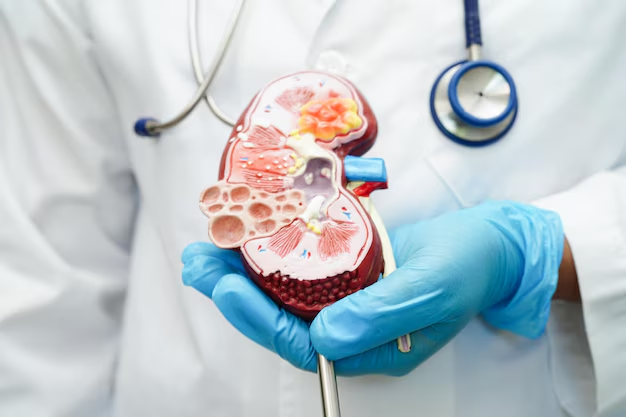Your Guide to How Does Hypertension Cause Kidney Failure
What You Get:
Free Guide
Free, helpful information about HyperTension FAQ and related How Does Hypertension Cause Kidney Failure topics.
Helpful Information
Get clear and easy-to-understand details about How Does Hypertension Cause Kidney Failure topics and resources.
Personalized Offers
Answer a few optional questions to receive offers or information related to HyperTension FAQ. The survey is optional and not required to access your free guide.
How Hypertension Leads to Kidney Failure: What You Need to Know
Hypertension, commonly known as high blood pressure, is a silent force wreaking havoc in many peoples' lives. It is often undetectable without regular monitoring yet has profound impacts on the body when left uncontrolled. One of its significant and serious consequences is kidney failure. Understanding how hypertension causes kidney damage can be an essential step in preventing this outcome and taking control of your health.
The Connection Between Hypertension and Kidney Health
The kidneys are vital organs responsible for filtering waste and excess fluids from your blood, excreting them as urine. They also help regulate blood pressure, balance electrolytes, and stimulate red blood cell production. However, when blood pressure is persistently high, it places immense stress on the blood vessels in the kidneys.
This sustained stress leads to kidney damage by causing structural changes in the glomeruli, the tiny filtering units. High pressure and flow can thicken the blood vessels, narrowing their passage and eventually reducing the blood supply. This process, called nephrosclerosis, diminishes the kidney's ability to perform its functions. Over time, as damage compounds, it can progress to chronic kidney disease (CKD) and potentially kidney failure.
Consequences of Untreated Hypertension on Kidneys
Reduced Kidney Function: As the kidney tissues become damaged, their ability to filter blood effectively decreases. This stage is often symptomless but needs early detection through blood and urine tests.
Electrolyte Imbalances: With impaired filtration, electrolytes like sodium and potassium can become unbalanced, impacting heart, muscle, and nerve functions.
Increased Risk of Heart Disease: Kidney impairment can exacerbate heart disease, as these two organs are closely connected in maintaining overall fluid and blood pressure balance.
Progression to End-Stage Renal Disease (ESRD): In severe cases, untreated hypertension leads to ESRD, where dialysis or a kidney transplant becomes necessary.
Proactive Measures Against Hypertension-Induced Kidney Damage
- Regular Monitoring: Consistently check your blood pressure and kidney function, especially if you have a family history of hypertension or kidney disease.
- Healthy Lifestyle Choices: Adopt a low-salt diet, exercise regularly, avoid excessive alcohol consumption, and manage stress.
- Medication Adherence: If prescribed, follow your healthcare provider's guidance on taking antihypertensive medications to maintain normal blood pressure levels.
Financial and Educational Support for Managing Hypertension and Kidney Failure
For those managing hypertension and potential kidney complications, understanding financial aid and educational resources can alleviate some of the pressures:
- 📊 Medicaid and Medicare Assistance: Provides comprehensive coverage for eligible individuals, including treatment costs for CKD and ESRD.
- 💰 Local and Federal Aid Programs: Look into government programs like the Low Income Home Energy Assistance Program (LIHEAP) that can help manage living expenses, freeing up income for medical care.
- 💳 Credit Solutions: Companies offering credit consolidation and management services can help ease financial burdens by streamlining debt repayment.
- 🎓 Educational Grants: Explore scholarships and grants for continuing education, which can help families manage financial stress by reducing tuition costs.
- ✔️ State Kidney Programs: Some states offer specific programs or assistance for individuals with kidney disease.
- 📞 Financial Counseling: Professional counselors can offer personalized advice on managing medical expenses while maintaining your overall financial health.
By actively managing hypertension and recognizing the available resources, individuals can mitigate the risk of kidney failure while gaining financial stability and support.
What You Get:
Free HyperTension FAQ Guide
Free, helpful information about How Does Hypertension Cause Kidney Failure and related resources.

Helpful Information
Get clear, easy-to-understand details about How Does Hypertension Cause Kidney Failure topics.

Optional Personalized Offers
Answer a few optional questions to see offers or information related to HyperTension FAQ. Participation is not required to get your free guide.


Discover More
- a 66 Year Old Female With a History Of Hypertension
- Are Eggs Bad For Hypertension
- Are Eggs Good For Hypertension
- Are Endocrine Disorders Causing Hypertension Rare
- Can Adderall Cause Hypertension
- Can Alcohol Cause Hypertension
- Can Allergies Cause Hypertension
- Can Anemci People Get Hypertension
- Can Anemia Cause Hypertension
- Can Antibiotics Cause Hypertension
